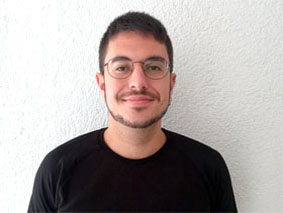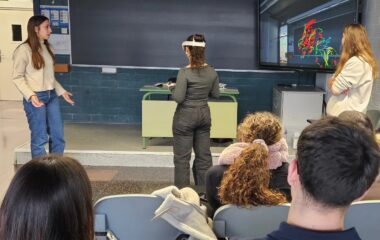- sec.iqcc@udg.edu
- +34 972 41 83 57
Poater, Albert
Computational Organometallic Catalysis
Contact info:
Dr. Albert Poater
albert.poater@udg.edu
Tel. (+34) 972 41 94 12 – 639620066
Website

Selected publications
Intramolecular Interception of the Remote Position of Vinylcarbene Silver Complex Intermediates by C(sp3)−H Bond Insertion
Angew. Chem. Int. Ed., 2023, 62, e202215163
DOI: 10.1002/anie.202215163
Albert Poater
Never too late: Stereoselective alkyne semi-hydrogenation by Ir catalysis
Chem Catalysis, 2022, 2, 1245-1246
DOI: 10.1016/j.checat.2022.05.025
Ahad Hanifpour, Naeimeh Bahri-Laleh, Mehdi Nekoomanesh-Haghighi, Albert Poater
Coordinative chain transfer polymerization of 1-decene in the presence of a Ti-based diamine bis(phenolate) catalyst: a sustainable approach to produce low viscosity PAOs
Green Chem., 2020, 22, 4617-4626
DOI: 10.1039/D0GC00439A
Jesús Antonio Luque-Urrutia, Miquel Solà, David Milstein, Albert Poater
Mechanism of the Manganese-Pincer-Catalyzed Acceptorless Dehydrogenative Coupling of Nitriles and Alcohols
J. Am. Chem. Soc., 2019, 141, 2398-2403
DOI: 10.1021/jacs.8b11308
Laura Falivene, Zhen Cao, Andrea Petta, Luigi Serra, Albert Poater, Romina Oliva, Vittorio Scarano, Luigi Cavallo
Towards the online computer-aided design of catalytic pockets
Nat. Chem., 2019, 11, 872-879
DOI: 10.1038/s41557-019-0319-5
Dr. Albert Poater
Research overview
Computational organometallic catalysis
This research line has a very simple goal: get computationally a new catalyst or family of catalysts for any kind of organometallic reaction with some clear characteristics: more efficiency, cheaper, no toxic or less toxic than the available ones. DFT calculations together with tools such as the steric maps obtained thanks to the vBur parameter aim to fulfil this objective; together with a long list of international collaborators: S. P. Nolan, K. Grela, G. W. Coates, C. Slugovc, L. Cavallo, J.-M. Basset,… In particular, olefin metathesis is found to be a useful tool to generate drugs against hepatitis for example, by means of the synthesis of macrocycles; or the study of the polymerization by Co-based catalysis is of industrial interest.

Unravel computationally the mechanism of society concerns
This research line plans to find solutions for issues that create society concerns such the fixation of carbon dioxide, together with experiments carried out by Prof. S. P. Nolan or Prof. J.-M. Basset. The dual metal concerted catalysis is mandatory to fix CO2 and/or facilitate its transformation to other substances such as carbonates. On the other hand, the hydrogenation of CO2 by Knölker iron based catalysts is another way to reduce CO2 concentration. Last but not least, the generation of carbon free sources of energy, such as hydrogen, through water oxidation catalysis, in collaboration with Prof. A. Llobet or Prof. K. Takanabe, is explored.

People
Principal Investigator
Staff and Postdocs

Arijit Saha
Postdoc (Beatriu de Pinós)
Supervisor:- A. Poater
- A. Pla-Quintana
- A. Roglans

Ouissam El Bakouri
Postdoc (ONCE)
Supervisor:- M. Solà
- A. Poater

Roger Monreal
Postdoc
Supervisor:- A. Pla-Quintana
- A. Poater
PhD and MACMoM students

Muhammad Ehtisham
PhD student (FI)
Supervisor:- J. M. Luís
- A. Poater

Anna Vidal
PhD student
Supervisor:- A. Poater
- A. Comas (UAB)

Arslan Ahmad
PhD student (FPU)
Supervisor:- A. Poater

Aythami Soto Rodríguez
PhD Student
Supervisor:- A. Poater

Clara Mauclaire
PhD Student
Supervisor:- A. Poater
- Jean Luc Renaud (Université Sourbonne)

Mahrou Moshfeghnia
PhD Student
Supervisor:- A. Poater

Mou Mandal
Postdoc
Supervisor:- A. Poater
- A. Pla-Quintana
- A. Roglans

Rabab Maqsood
PhD student (FI)
Supervisor:- A. Poater

Thalía Ortiz
PhD (IF-UdG)
Supervisor:- A. Poater
Francesco Dellaversano
Erasmus student
Supervisor:- A. Poater

Muhammad Ishaq
PhD student
Supervisor:- A. Poater
Victor Alonso
Master Student
Supervisor:- A. Poater
Funding
MCIU Proyecots I+D.
Researcher: Dr. Albert Poater
Reference: PID2021-127423NB-100
Funding: 133.100 €
Period: 01/09/2022 – 31/08/2025
Bestriu de Pinós
Researcher: Dr. Arijit Saha (A. Poater)
Reference: 2022 BP00051
Funding: 152.348 €
Period: 01/05/2024 – 30/04/2027
Collaborations
Steven P. Nolan – Ghent University (Belgium), collaboration with Albert Poater.
Jean-Luc Renaud – University of Caen-Normandie (France), collaboration with Albert Poater.
Remi Chauvin – LCC-CNRS (France), collaboration with Albert Poater.
Naimeh Bahri – Iran Polymer and Petrochemical Institute (Iran), collaboration with Albert Poater.
Giovanni Talarico – University of Naples Federico II (Italy), collaboration with Albert Poater.
Luis Miguel Azofra – Universidad de las Palmas de Gran Canaria (Spain), collaboration with Albert Poater.
Valerio D’ Elia – VISTEC (Thailand), collaboration with Albert Poater.
Michal Szostak – Rutgers University (United States), collaboration with Albert Poater.
News
Chemistry Department open doors 2026
Last 29th January the Chemistry Department of the University of Girona opened its doors
PhD defense Roger Monreal Corona
On 14th of January will be the defense of the doctoral thesis of Roger
Roger Monreal wins Best Presentation Award at TraPCat4 2025
Last month (November 20-21, 2025) took place the 4th Trans Pyrenean Meeting on Catalysis in Barcelona. MSc.
Albert Poater repeats the Academy of Excellence Program -ICREA award
ICREA is a foundation promoted by the Catalan Government whose aim is to





